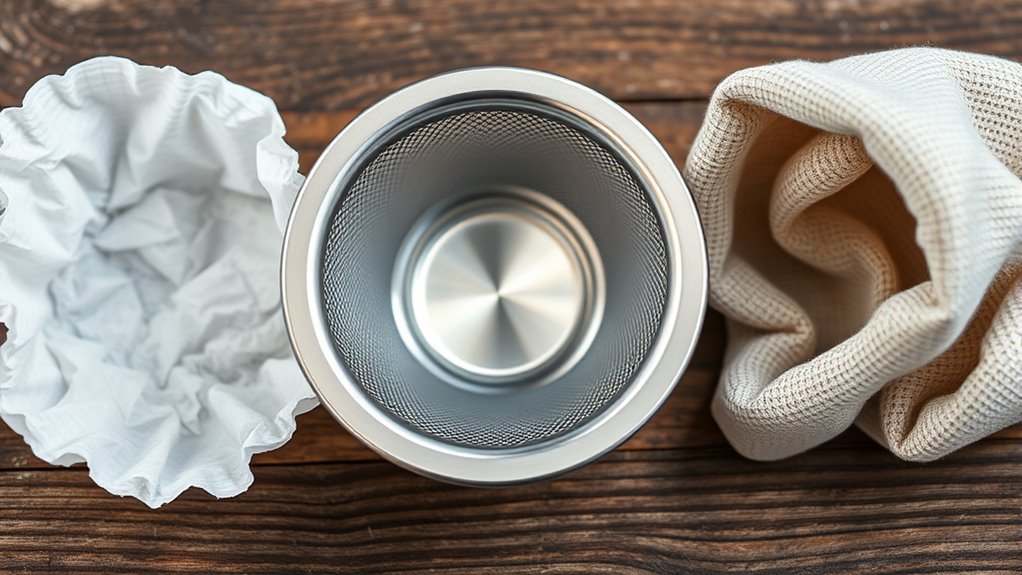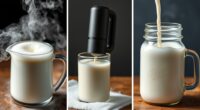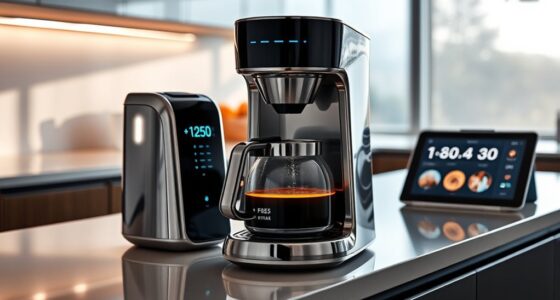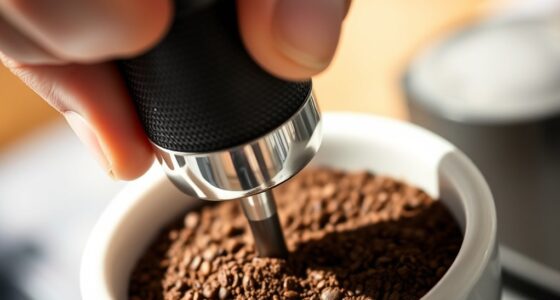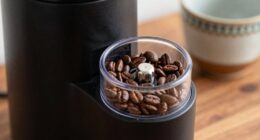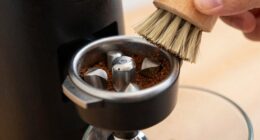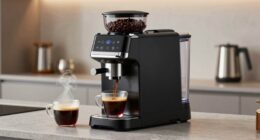Choosing your coffee filter impacts flavor, body, and clarity. Paper filters create a clean, smooth brew by trapping oils and fine grounds, making your coffee lighter and mellow. Metal filters let more oils and particles through, resulting in a fuller-bodied, richer flavor with some grit. Cloth filters offer a balanced approach, passing some oils but filtering out most grounds. To discover how each type affects your cup, keep exploring the details behind these options.
Key Takeaways
- Paper filters produce a cleaner, lighter brew by trapping oils and fine grounds, ideal for a smooth coffee experience.
- Metal filters allow more oils and particles, resulting in a fuller-bodied, richer, and more robust flavor profile.
- Cloth filters strike a balance, filtering out most grounds while passing some oils, offering smoothness with enhanced flavor.
- Paper filters are disposable and convenient, while metal and cloth filters are reusable, reducing waste and environmental impact.
- Material choice influences flavor: paper mellows, metal enhances richness, and cloth offers a balanced, nuanced cup.
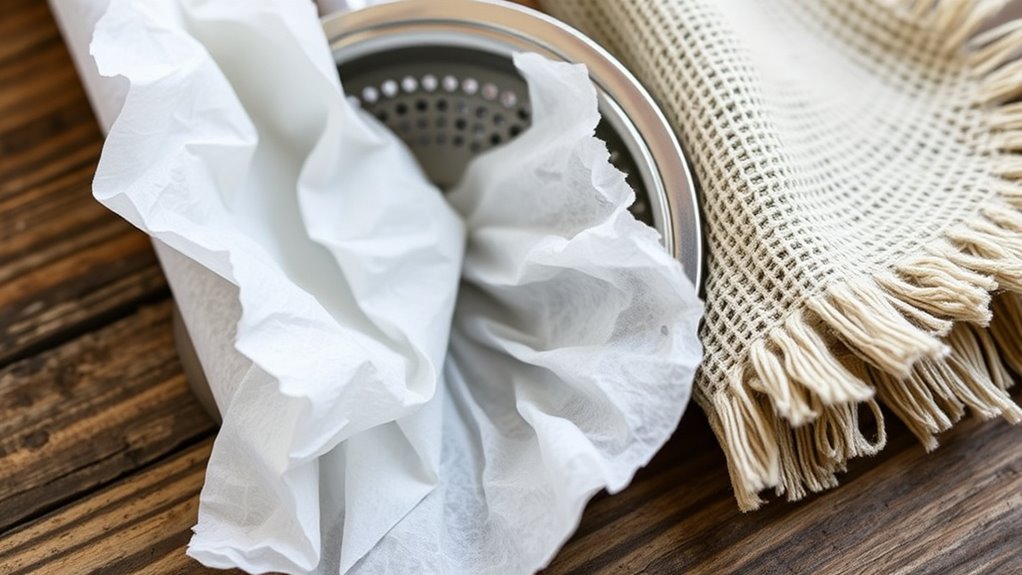
Are you wondering what makes a coffee filter essential for your morning brew? The type of filter you choose can significantly influence the final taste, and understanding the filter material differences is key to mastering your coffee game. Paper, metal, and cloth filters each have unique qualities that impact brewing flavor, so selecting the right one depends on your taste preferences and brewing style. For example, the material’s porosity and filtration capacity directly affect how much oil and sediment make it into your cup, shaping the overall flavor profile.
Paper filters are the most common and offer a straightforward, hassle-free option. They typically trap more oils and fine coffee grounds, resulting in a clean, crisp cup. The filter material differences here are notable; standard paper filters are designed to absorb oils, which can mellow the overall flavor and reduce the bitterness. This is ideal if you prefer a smooth, lighter brew. However, some specialty papers are unbleached or thicker, which can influence the brewing flavor impacts by either allowing more oils through or creating a slightly different extraction process. Because paper filters are disposable, they’re also convenient but generate waste, which might be a concern if you’re eco-conscious.
Paper filters are convenient, trap oils, and produce a clean, smooth cup.
Metal filters, usually made of stainless steel or gold-plated mesh, differ fundamentally in their construction. They allow more oils and fine particles to pass through, producing a fuller-bodied coffee with richer flavors and a more robust mouthfeel. The filter material differences here mean you get a more complex extraction, highlighting the coffee’s natural oils and nuances. Metal filters are durable and reusable, making them a cost-effective and environmentally friendly choice over time. They also tend to brew faster, but because they let more oils through, your coffee might have a slightly grittier texture and a more intense flavor profile. If you enjoy a bolder cup with more body and depth, a metal filter could be your best pick.
Cloth filters occupy a middle ground, often used in traditional brewing methods like pour-over or percolators. Made from fine cotton or hemp, they strike a balance by filtering out most grounds but allowing some oils to pass through. Their filter material differences mean that they can produce a smooth yet flavorful cup, preserving some of the oils that paper filters trap but offering a cleaner taste than metal filters. Cloth filters are reusable, which makes them an eco-friendly option, though they require regular cleaning to prevent buildup and maintain their filtration quality. The brewing flavor impacts are subtle but noticeable; your coffee maintains more of its natural oils and complexity while avoiding the gritty texture sometimes associated with metal filters. Proper maintenance of the filter material is essential to ensure consistent performance and flavor.
Frequently Asked Questions
Are Reusable Filters More Cost-Effective Long-Term?
You’re wondering if reusable filters save you money long-term. They often offer better cost savings because of their durability—they last much longer than paper filters, reducing ongoing purchases. While initial costs might be higher, you save over time by avoiding frequent replacements. Plus, reusable filters are eco-friendly, so you contribute less waste. Overall, investing in a durable, reusable filter is a smart choice for long-term savings and environmental benefits.
How Do Filters Impact Coffee’S Flavor Profile?
You notice that filter material considerably impacts your coffee’s flavor profile through flavor extraction. Metal filters allow more oils and tiny particles, giving your brew a fuller, richer taste. Cloth filters also retain oils but offer a smoother, cleaner flavor. Paper filters trap oils and fine grounds, resulting in a lighter, brighter cup. Your choice of filter material shapes the overall flavor experience, so pick based on your preferred coffee style.
Can Metal Filters Cause Over-Extraction?
A metal filter can cause over-extraction if it clogs easily or if you brew too long, turning your coffee into a bitter, overly intense brew. The risk of over-extraction rises because metal filters allow more oils and fine particles through, which can lead to over-extraction. Be cautious and monitor brewing time closely to avoid this; otherwise, your perfect cup might turn into a flavor disaster!
Are Cloth Filters Hygienic for Repeated Use?
Cloth filters can be hygienic for repeated use if you clean them regularly. You should wash them after each use to prevent bacterial growth and guarantee proper cleaning frequency. Neglecting this can lead to bacteria buildup, making your coffee less safe. So, yes, cloth filters can be hygienic, but only if you maintain good cleaning habits. Proper maintenance keeps them safe and effective for your daily coffee routine.
What Are the Environmental Benefits of Each Filter Type?
This is the most important question you’ll ask about coffee filters—your choice impacts the planet! Each filter type offers unique sustainability benefits. Metal filters are durable and long-lasting, reducing waste, while cloth filters are made from eco-friendly materials and are reusable. Paper filters are biodegradable but generate more waste. Your decision can markedly lower your carbon footprint by selecting the most eco-friendly option, making a real difference in sustainability comparison.
Conclusion
Choosing the right filter can elevate your coffee experience. Did you know that metal filters allow more oils and flavors, resulting in a richer taste, while paper filters trap more impurities for a cleaner brew? notably, studies show that using a metal filter can increase the extraction of antioxidants, boosting your coffee’s health benefits. So, whether you prefer a crisp, clean cup or a full-bodied flavor, understanding your filter options helps you craft the perfect brew every time.
